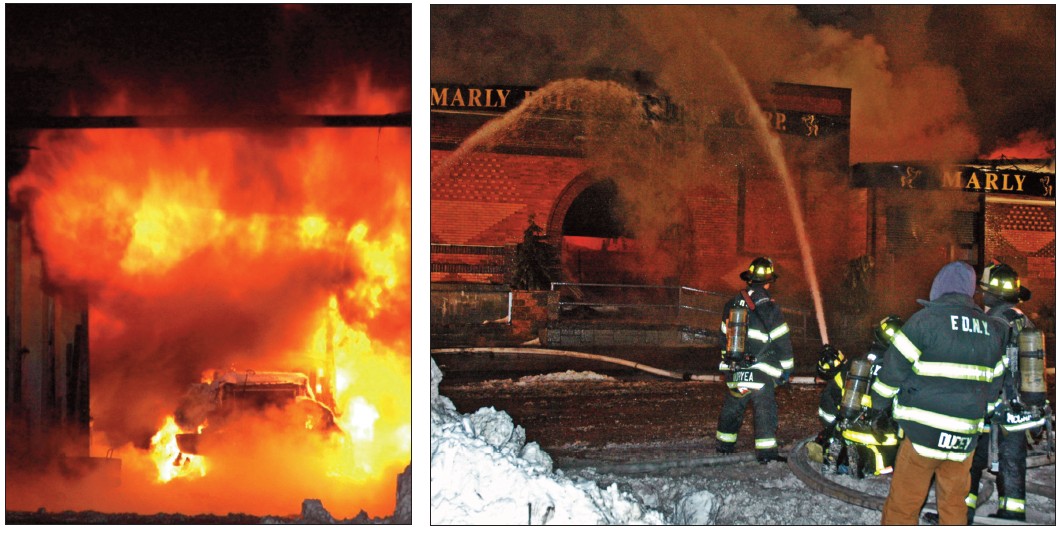Board 5 Chair Says ‘Inhumane’ Glendale Shelter Not Worth It
The numbers don’t add up for the proposed homeless shelter in Glendale, according to Community Board 5′s chairperson.

Following previous letters from local elected officials, Vincent Arcuri-on behalf of the advisory body-urged Mayor Bill de Blasio and Homeless Services Commissioner Gilbert Taylor in a Feb. 11 letter to scrap the planned transitional shelter for up to 125 families at 78-16 Cooper Ave., a long-vacant, former industrial building.
Arcuri read the message publicly at the conclusion of Board 5’s meeting last Wednesday, Feb. 12, in Middle Village.
As previously reported, Samaritan Village formally proposed the shelter last August in answering the Department of Homeless Services’ (DHS) open-ended request for proposals (RFP) for new homeless shelters across the city. The DHS recommended preliminary approval of the project last December.
Arcuri also called into question the cost to build and operate the shelter, which-according to the proposal submitted to the DHS- would cost just over $27.5 million.
“We are especially concerned with the inconsistencies in the proposed cost factors associated with this project,” he wrote to de Blasio and Taylor. “The proposed contract requests approval of a five-year plan, composed of one year of construction and four years of operation for a total of $27,543,216.”
Through his own analysis, Arcuri estimated reconstruction of the former factory for residential purposes would cost between $10 and $11 million. The anticipated annual cost of operations is between $6 and $7 million, and Samaritan Village would pay $3 million annually in rent to the property’s owner, Michael Wilner.
Add it all up, Arcuri stated, and the combined annual costs for the shelter’s first year runs about $7.5 million short of the figure provided in the RFP.
“Additionally, we are constantly told that DHS does not pay for construction, and in discussion with the property owner, we are told that he is not paying for the reconstruction and expansion of his existing facility,” he wrote. “What constitutes the roughly $7,500,000 excess in the proposed contract when the construction costs are included in our analysis?”
The board is also “against warehousing unfortunate families in such inhumane facilities,” Arcuri added. He stated providing displaced residents with Section 8 housing benefits, rather than building new homeless shelters, would prove more economical and humane for the city.
“We object to spending the equivalent of $40,000 per year, per family for such inhuman conditions, when currently, Section 8 housing costs about $21,600 per year, per family, and the median home mortgage in Queens County is less than $28,000 per year,” Arcuri wrote.
As further evidence, he pointed to a recent report on CBS’ 60 Minutes which indicated that “providing the homeless with apartments was immensely less costly than housing them in shelters, and produced greater results in reintegrating them into society.”
Arcuri’s letter was forwarded to City Comptroller Scott Stringer, who has the authority to approve or reject city contracts such as one authorizing the homeless shelter’s construction and operation.
During last Wednesday’s meeting, Arcuri stated the board had heard no updates regarding the proposal’s status, though rumors about it persist.
Kathy Moore, a representative of Queens Borough President Melinda Katz, provided board members with a copy of Katz’s Jan. 27 letter to DHS Commissioner Taylor urging him to reject the Glendale shelter proposal.
“I am aware that, under Article 17 of the New York State Constitution, the city is legally obligated to house homeless individuals,” Katz wrote. “However, putting children in a facility that was once a warehouse that used environmentally sensitive products is not the answer.”
The borough president also referred to several “designated Brownfields which surround this location,” including the former Kliegman Brothers dry cleaning warehouse on 77th Avenue at 76th Street, which is undergoing environmental remediation.
Katz also dismissed claims by the DHS that the Cooper Avenue site is close to public transportation, as it is more than a mile from the nearest subway station (the Metropolitan Avenue M train stop in Middle Village) and several blocks from three bus lines (the Q29, Q47 and Q54).
“This cannot be considered accessible to these residents who will need to commute to educational institutions, stores, the workplace and other places of interest,” she added. “This proposed facility will house 125 families, thereby adding more children into the most overcrowded school district in my borough. The shortage of school seats in District 24 is an ongoing problem that should not be exacerbated.”
Katz concluded the shelter, if constructed, “does not offer an appropriate location for families to thrive.”

































